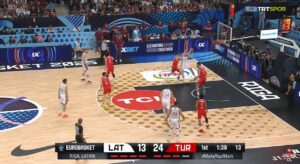Turkey’s State Broadcaster Airs EuroBasket 2025 With Illegal Betting Ads
By Erdem / 28/08/25
 During EuroBasket 2025, ads for 1xBet — a betting company banned in Turkey — appeared on the broadcasts of TRT, the country’s state television. The incident has sparked debate over how illegal gambling promotion ended up on national TV.
During EuroBasket 2025, ads for 1xBet — a betting company banned in Turkey — appeared on the broadcasts of TRT, the country’s state television. The incident has sparked debate over how illegal gambling promotion ended up on national TV.
As EuroBasket 2025 unfolds, viewers in Turkey noticed 1xBet logos flashing across courtside advertising boards during live games broadcast by TRT, Turkey’s state broadcaster. While FIBA officially lists 1xBet as a global partner, the company is banned under Turkish law. This means that state television has effectively aired the branding of an operator prohibited in the country, raising questions about legality, broadcasting standards, and possible regulatory action.
EuroBasket and the 1xBet Sponsorship Deal
 FIBA, basketball’s world governing body, signed a three-year global sponsorship deal with 1xBet, making the betting company an official partner for all major national team tournaments, including EuroBasket 2025. The agreement covers both 5-on-5 and 3×3 competitions and guarantees 1xBet visibility on courtside boards and digital platforms throughout the events.
FIBA, basketball’s world governing body, signed a three-year global sponsorship deal with 1xBet, making the betting company an official partner for all major national team tournaments, including EuroBasket 2025. The agreement covers both 5-on-5 and 3×3 competitions and guarantees 1xBet visibility on courtside boards and digital platforms throughout the events.
Internationally, this partnership is treated as a routine commercial arrangement. But in Turkey, 1xBet is banned and officially classified as an illegal gambling operator. That means whenever EuroBasket broadcasts are shown on Turkish television, the sponsor’s branding — fully legitimate abroad — becomes illegal advertising in Turkey.
Previous Cases: Private Broadcasters Penalized
This is not the first time international betting sponsorships have triggered problems in Turkey. In past years, private broadcasters owned by prominent Turkish media figures — such as Sadettin Saran, head of the S Sport network, and Acun Ilıcalı, founder of the streaming platform Exxen — were fined after similar betting ads appeared during live sports coverage.
Turkey’s media regulator (RTÜK) considered the display of such sponsorships to be a violation of domestic law, since all foreign betting companies are banned in Turkey. Some of these disputes even escalated into court proceedings, putting significant financial and legal pressure on the broadcasters involved.
Now that the same issue has surfaced on Turkey’s state broadcaster TRT, the debate over potential double standards has reignited: will the authorities hold their own state-run channel accountable in the same way they penalized private outlets?
Legal Worldwide, Banned in Turkey
Across much of the world, 1xBet operates as a licensed betting company. It sponsors globally recognized clubs and competitions, including FC Barcelona, Paris Saint-Germain, and Italy’s Serie A. For international federations like FIBA, such deals are seen as normal commercial partnerships that bring in vital revenue.
In Turkey, however, the legal framework is very different. All foreign betting platforms are blocked by the state, and their promotion is explicitly outlawed. The only legal form of sports betting is through the state-controlled monopoly known as İddaa. Any advertisement or branding of foreign betting operators is treated as “illegal gambling promotion” under Turkish law.
This clash creates a striking contradiction: what is fully legitimate abroad instantly becomes illegal when broadcast in Turkey. The EuroBasket 2025 coverage has made that contradiction visible on a global stage.
All Eyes on Turkey’s Broadcast Regulator
The controversy has now shifted attention to RTÜK, Turkey’s national broadcast regulator. The body oversees television and radio content, enforcing media laws and issuing fines when channels are found in violation.
In the past, RTÜK did not hesitate to punish private broadcasters when betting sponsors appeared on screen, even if those sponsors were official partners of international tournaments. Some of those cases led to substantial financial penalties and legal battles.
Now the same situation involves Turkey’s state broadcaster TRT. The key question is whether RTÜK will apply the same standards to a government-owned channel as it did to private companies. A decision to sanction TRT would mark the first time state television faced punishment for airing the branding of a banned betting operator, setting a significant precedent for future international sports broadcasts in Turkey.
A Way Forward: Opening the Market to Competition
The EuroBasket 2025 controversy has highlighted more than just a broadcasting issue — it has reignited debate over the structure of Turkey’s betting market. Under current law, all sports betting is run through İddaa, the state-controlled monopoly, while foreign operators like 1xBet are banned outright.
Critics argue that this rigid system backfires. It restricts broadcasters who carry international events, it funnels all revenue into a single state-run channel, and it pushes many Turkish bettors toward unregulated black-market platforms.
A growing number of experts believe the solution is regulated competition rather than a monopoly. Opening the market to licensed foreign and domestic operators could increase tax revenues, reduce demand for illegal websites, and relieve broadcasters from legal risks when covering international sports.
The 1xBet controversy on Turkey’s state television has therefore become more than a one-off scandal. It illustrates the urgent need to rethink how gambling laws align with the realities of global sports sponsorships and broadcasting.